
Seoul National University is a public research university located in Seoul, South Korea. It is one of the SKY universities and a part of the Flagship Korean National Universities.
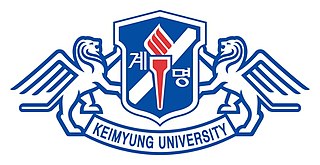
Keimyung University, abbreviated as KMU or Keimyung (Korean: 啓明), is a private university located in Daegu, the fourth largest city in South Korea. The university was founded in 1954 with the support of the leaders of the Northern Presbyterian Church of the U.S. as a Christian university. KMU is composed of three campuses in the city of Daegu, South Korea. They are named for their locations within the city; Daemyeong, which is near the downtown area, Seongseo, which is in the western part of the city, and also Dongsan campus which includes Dongsan Medical Center.
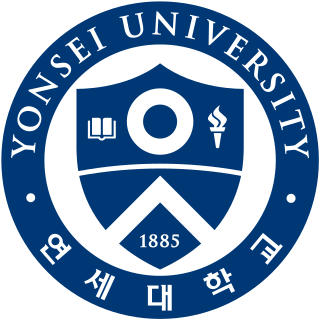
Yonsei University is a private Christian university in Seoul, South Korea. It is part of the SKY universities.

Hankuk University of Foreign Studies is a private research university based in Seoul, in South Korea. The university currently teaches 45 foreign languages. In addition, it contains studies in humanities, law, political science, social sciences, business, medical science, natural sciences, and engineering.

The Catholic University of Korea (Korean: 가톨릭대학교) is a private Roman Catholic university in Bucheon, Gyeonggi Province, South Korea. It was established in 1855. The Catholic University of Korea operates campuses in Seoul and in the neighboring Bucheon. The university's school of medicine operates eight affiliated hospitals throughout the country.
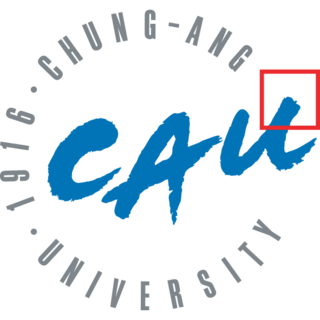
Chung-Ang University is one of the top leading private research universities in Seoul, South Korea. The university operates two campuses: main campus located in Dongjak District, Seoul, and an additional campus in Anseong, Gyeonggi Province. CAU consists of 16 undergraduate colleges and 16 graduate schools.

Dankook University, abbreviated as DKU, is a private research university in Yongin and Cheonan, South Korea. The university was established in 1947. It was the first university established after the National Liberation Day of Korea, and its original location was in Jongno District and Yongsan District, Seoul.

Dongduk Women's University is a private university in Seoul, South Korea.

Korea University is a private university in Seoul, South Korea. Established in 1905, the university was named after Goguryeo. The university is one of the SKY universities.
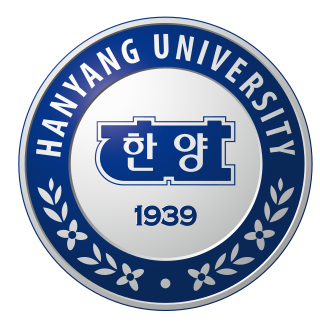
Hanyang University is a private research university in Seoul and Ansan, South Korea. Hanyang derives from the former name of the capital Seoul used during the Joseon Dynasty. The university was founded in 1939 as an engineering school, and was the country's first college to offer engineering and architecture programs.

Gyeongsang National University is one of ten Flagship Korean National Universities located in Jinju, South Gyeongsang Province.

Hongik University is a private university in Seoul, South Korea. Founded by an activist in 1946, the university is located in Mapo-gu district of central Seoul, South Korea with a second campus(branch campus) in Sejong.

Pukyong National University is a national university in Busan, South Korea, formed in 1996. The university has two campuses, Daeyeon-dong and Yongdang-dong, situated near the coastal district of Nam-gu. PKNU has a traditional focus on fisheries sciences and other maritime fields, and has extensive facilities for Marine and Technology studies.

The University of Suwon (Korean: 수원대학교) is a university in Hwaseong, Gyeonggi Province, South Korea.

Myongji University is a private, Christian university founded in 1948 in South Korea. It provides higher education in the fields of engineering, sciences and humanities. It has two campuses: the Social Science Campus is located in Seoul and the Natural Science Campus is in Yongin which is 35 kilometres (22 mi) south of the capital. It consists of 10 colleges, 42 departments, seven faculties and eight specialized postgraduate programs.
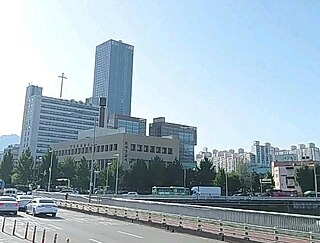
Dobong District is one of the 25 districts of Seoul, South Korea. As of 2020, Dobong has a population of 315,979 and an area of 20.71 square kilometres (8.00 sq mi), and is divided into four administrative neighborhoods. The district is located in northeastern Seoul, bordering the Gyeonggi Province cities of Yangju and Uijeongbu to the north, and the districts of Gangbuk to the southwest and Nowon to the east.

Soongsil University (SSU) is the first modern university in Korea, dating its history back to 1897. It was founded under the Christian missionary William M. Baird. The campus is located in 369 Sangdo-ro, Dongjak-gu, Seoul, South Korea.

Seoul National University of Science and Technology is a national university located in Nowon-gu, Seoul, South Korea.
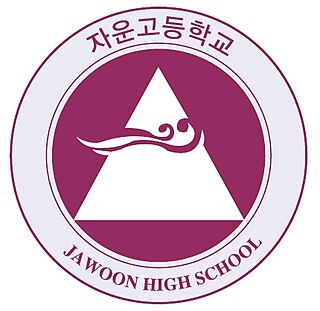
Jawoon High School, established in 2004, is a public high school located in Chang 4-Dong, Dobong-gu, Seoul. Jawoon High School is one of the newest schools with up-to-date facility in Dobong-gu, and it is well known as a Dobong-Vision School with Sunduck High School.

Gachon University is an academic institute located in South Korea. The current structure of Gachon university is the result of a merger between four existing universities. Gachon University of Medicine and Science and Gachon-gil College merged in 2007, Kyungwon University and Kyungwon College merged in 2007, and Gachon University of Medicine and Science and Kyungwon University merged in 2012. Gachon University has three campuses for undergraduates, the Global Campus (primary) located in Seongnam, satellite campuses on Ganghwa Island and in Yeonsu-dong, and the School of Medicine in Guwol-dong, Namdong-gu, Incheon, South Korea. Gachon University signed a strategic partnership with Hawaii Pacific to allow students to study abroad.




















